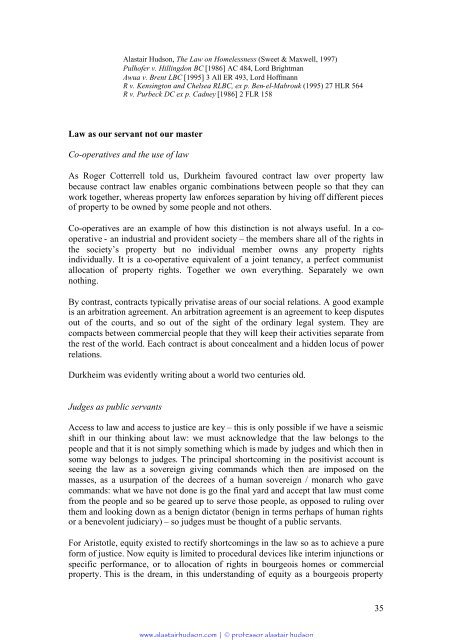England's dreaming equity, trust and conscience - alastairhudson.com
England's dreaming equity, trust and conscience - alastairhudson.com
England's dreaming equity, trust and conscience - alastairhudson.com
You also want an ePaper? Increase the reach of your titles
YUMPU automatically turns print PDFs into web optimized ePapers that Google loves.
Alastair Hudson, The Law on Homelessness (Sweet & Maxwell, 1997)Pulhofer v. Hillingdon BC [1986] AC 484, Lord BrightmanAwua v. Brent LBC [1995] 3 All ER 493, Lord HoffmannR v. Kensington <strong>and</strong> Chelsea RLBC, ex p. Ben-el-Mabrouk (1995) 27 HLR 564R v. Purbeck DC ex p. Cadney [1986] 2 FLR 158Law as our servant not our masterCo-operatives <strong>and</strong> the use of lawAs Roger Cotterrell told us, Durkheim favoured contract law over property lawbecause contract law enables organic <strong>com</strong>binations between people so that they canwork together, whereas property law enforces separation by hiving off different piecesof property to be owned by some people <strong>and</strong> not others.Co-operatives are an example of how this distinction is not always useful. In a cooperative- an industrial <strong>and</strong> provident society – the members share all of the rights inthe society’s property but no individual member owns any property rightsindividually. It is a co-operative equivalent of a joint tenancy, a perfect <strong>com</strong>munistallocation of property rights. Together we own everything. Separately we ownnothing.By contrast, contracts typically privatise areas of our social relations. A good exampleis an arbitration agreement. An arbitration agreement is an agreement to keep disputesout of the courts, <strong>and</strong> so out of the sight of the ordinary legal system. They are<strong>com</strong>pacts between <strong>com</strong>mercial people that they will keep their activities separate fromthe rest of the world. Each contract is about concealment <strong>and</strong> a hidden locus of powerrelations.Durkheim was evidently writing about a world two centuries old.Judges as public servantsAccess to law <strong>and</strong> access to justice are key – this is only possible if we have a seismicshift in our thinking about law: we must acknowledge that the law belongs to thepeople <strong>and</strong> that it is not simply something which is made by judges <strong>and</strong> which then insome way belongs to judges. The principal short<strong>com</strong>ing in the positivist account isseeing the law as a sovereign giving <strong>com</strong>m<strong>and</strong>s which then are imposed on themasses, as a usurpation of the decrees of a human sovereign / monarch who gave<strong>com</strong>m<strong>and</strong>s: what we have not done is go the final yard <strong>and</strong> accept that law must <strong>com</strong>efrom the people <strong>and</strong> so be geared up to serve those people, as opposed to ruling overthem <strong>and</strong> looking down as a benign dictator (benign in terms perhaps of human rightsor a benevolent judiciary) – so judges must be thought of a public servants.For Aristotle, <strong>equity</strong> existed to rectify short<strong>com</strong>ings in the law so as to achieve a pureform of justice. Now <strong>equity</strong> is limited to procedural devices like interim injunctions orspecific performance, or to allocation of rights in bourgeois homes or <strong>com</strong>mercialproperty. This is the dream, in this underst<strong>and</strong>ing of <strong>equity</strong> as a bourgeois property35www.<strong>alastairhudson</strong>.<strong>com</strong> | © professor alastair hudson













